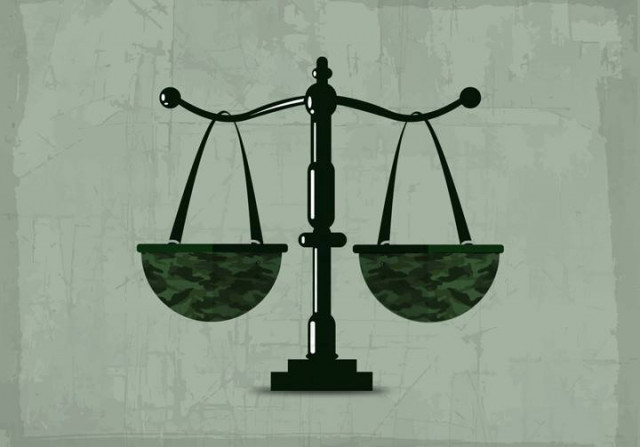Govt left red-faced as Senate defers voting till March 28
Despite marathon consultations, govt fails to muster required numbers

The Twenty Eighth Amendment Bill, 2017 was also tabled in Senate for consideration and passage. CREATIVE: AAMIR KHAN
The second reading of the Twenty-Eighth Amendment Bill 2017 was in progress when Chairman Raza Rabbani had to abruptly adjourn proceedings till March 28, just before the final vote. However, the upper house passed corresponding amendments in the Pakistan Army Act, 1952.
Both the bills – the 28th Constitution Amendment Bill, 2017 and Army Act (Amendment) Bill, 2017 – were introduced in the Senate by Law Minister Zahid Hamid. The National Assembly has already passed the bills.
Two nationalist parties from Balochistan – the PkMAP and the BNP-Mengal – opposed the bills, while the JUI-F moved amendments in the 28th constitutional amendment bill. Both the PkMAP and JUI-F are allies of the ruling PML-N.
Military courts revival wins NA nod
The JUI-F proposed amendments, suggesting omission of terms 'religion’ and ‘sect' in the draft. However, these amendments were rejected through a voice vote.
The Senate session, which was due to prorogue last week, was extended only to adopt the legislation on military courts. The Senate chairman allowed the members to make lengthy speeches during the second reading in a bid to help the government ensure enough members for the voting.
However, the government later claimed it was short of a couple of votes. Independent observers, however, dispute this claim. The Free and Fair Election Network’s parliamentary observers counted presence of 45 members at the onset of the proceedings and 46 by the end. In the 104-member upper house, at least 69 votes are required to pass an amendment in the Constitution.
Realising gravity of situation the prime minister, who was greeted with loud desk thumbing upon his arrival, left the house quietly minutes before the chair announced to put off voting till the next sitting.
It is also unusual that the Senate will now reconvene after a gap of five days. Normally, when in session, the National Assembly and Senate are adjourned for a maximum of two days and that too on weekends.
The Senate has already completed its parliamentary year during this session. If prorogued, the new session will be convened after calendar for new parliamentary year is approved. To avoid any unnecessary delay in passing laws for the military courts, the current session was prolonged.
Through this 28th amendment, the government wants to extend term of military courts for yet another two years. Established through 21st amendment on Jan 2015 for speedy trial of hardcore terrorists, the military courts ceased to function on expiry of their term on Jan 7, 2017.
Speaking on the floor of the house, the law minister earlier said the bill was tagged as 28th amendment since amendments on different other subjects from the 23rd to 27th constitutional amendments had been pending before parliament.
In a last-ditch effort to cajole the estranged JUI-F, Zahid Hamid said the word ‘use of religion and sect’ incorporated in the 21st amendment, had been replaced with ‘misuse of religion and sect’ in the new draft.
However, the JUI-F parliamentary leader Maulana Attaur Rehman had already left the house after the amendments he moved were rejected. The JUI-F had abstained from voting on the bills in the NA on Tuesday while the PkMAP and an independent MNA had voted against the bill.
Prime Minister Sharif also had a meeting with the PkMAP’s chief Mehmood Khan Achakzai and the JUI-F chief Fazlur Rehman earlier in the day. Official statement issued after the meetings claimed that general political situation and development schemes were discussed.
However, it is believed that in the meeting which was held while Senate session was in progress the premier had tried to convince his allies to support the government-backed bills.
The government after a series of meetings had agreed to incorporate four proposals of the main opposition party, the PPP, in exchange for its support for the legislation.
The PPP is the largest party in the Senate with 28 members. In the current scenario, when the PkMAP and the JUI-F are opposing the laws on military courts, the PPP's active support is imperative to adopt the amendment.
The PPP's proposals were incorporated in the draft bill before it was passed by the National Assembly.
The new provisions allow the accused the right to engage a defence counsel of his choice. It has also been made obligatory to produce the accused before the court within 24 hours of arrest along with the complete charge sheet. Now Qanoom-e-Shahadaat is also applicable on the terror suspects.
The newly added provisions have slightly diluted criticism that adjudication through military courts did not meet international standards of fair trial.



















COMMENTS
Comments are moderated and generally will be posted if they are on-topic and not abusive.
For more information, please see our Comments FAQ